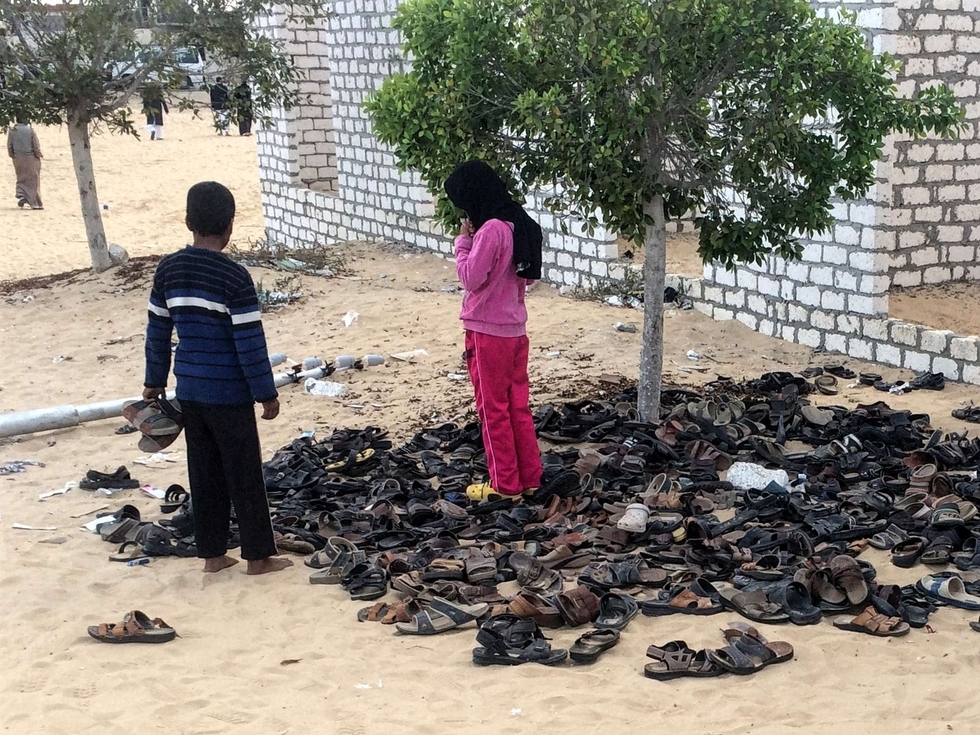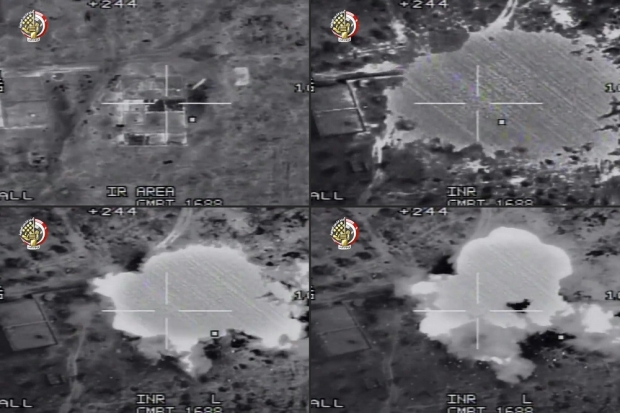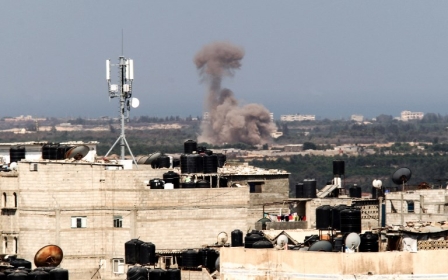'Our village has lost its soul': Despair follows Egypt's worst terrorist attack

CAIRO - Mohamed Khalil remembers the chaos as hundreds of bodies torn apart in Egypt's largest terrorist atrocity began arriving at Beir al-Abd's hospital.
Khalil, like many others, had rushed to the hospital to give blood and offer help in the aftermath of the massacre at the al-Rawda mosque, where militants detonated a bomb during Friday prayers, then used guns to mow down survivors.
Khalil saw first hand the consequences.
"There weren’t enough ambulances to carry all the corpses," he told Middle East Eye on Sunday. "We had to carry some of them in cars. We were shocked by how intense the bombing had been."
A video taken at the hospital shows rows of dead being laid out in the afternoon sun, as cars bring more bodies to the site. At least 27 of those killed were children.
There was little Khalil could do, such was the scale of death and injury. Those still alive were quickly transferred to Ismaliyya and Cairo, he said, and the people of Beir al-Abd were left to bury their dead.
"There were a lot of security men and a lot of dead. The people that knew how to helped the injured with first aid and the rest helped to move the dead.
"People had to start filling their private cars with corpses to carry them to be buried.
"A mass grave was made for the victims in Madar village, which is very close to al-Rawda. We counted 309 corpses. Eighteen other bodies were buried elsewhere in Beir al-Abd."
Egypt's government launched air attacks on what it said were those responsible, and destroyed vehicles it said were used in the massacre.
The president, Abdel Fattah al-Sisi, promised a "brute force" response: "The army and police will avenge our martyrs and return security and stability with force in the coming short period," he said on Saturday.
Authorities claimed the attackers flew the black banner of the Islamic State, which has called the Sufi branch of Islamic heretic. But the group, which is often quick to laud its acts of mayhem, has not claimed the massacre.
Saved by the deaths of others
The imam of al-Rawda mosque, Mohammed Abdel Fattah, described how he was saved from death by others who had been cut down around him.
The 26-year-old told AFP: "I was only two minutes into my sermon when I heard two explosions outside the mosque, and then I saw worshippers running in horror," he said.
"Then people entered the mosque and began firing at everyone who was still standing.
If my health allows it, I will return next Friday week and finish my sermon
- Mohammed Abdel Fattah, al-Rawda imam
"As soon as the shooting started I fell. I didn't see or feel anything except for the two or three bloodied bodies that fell on top of me."
From his hospital bed, Fattah vowed to return to what was left of the mosque to complete his sermon.
"If my health allows it, I will return next Friday week and finish my sermon," he said.
Churches across Egypt expressed solidarity and held prayers for the victims. In Gaza, news spread that people held blood donations and funerals for the victims.On social media, many friends of the victims mourned for and shared photos of the deceased. Munir el-Hawary, a teacher, wrote: "Oh the heartache, the entire school has died... my colleagues and my students in the al-Rawda preparatory and high school."
But whatever revenge is delivered, whatever culprits were found, and whatever happens at the mosque, Beir al-Abad has forever changed.
Khalil did not know if it would ever recover.
"Most of the men in the village have been killed,” he said. "Many families are now without breadwinners, sons, fathers and grandfathers.
“There is a well known family, al-Duwiri - almost all the men from that family have been killed."
The shock and the loss was too much for many.
The people are in a state of complete defeat. Our village has lost its soul
- Mohamed Khalil
"People want to leave," said Khalil. "A friend owns a shop, but he’s going to close it. There’s no one left to buy anything.”
"The people are in a state of complete defeat. Our village has lost its soul."
And for all of the promises of the government, the people of northern Sinai were left in fear of the next attack.
"The residents [of Sinai] have reached a point where they just feel extreme disenchantment," Khalil said.
"But no one would have expected something as big as this. That mosque had a special aura to it."
And now it will live forever as the site where Sinai's insurgency struck its most terrible blow.
"The people of Sinai feel like they have no one to protect them... that they are exposed to getting killed any time, in any number, at any place, even when they are praying.”
Stay informed with MEE's newsletters
Sign up to get the latest alerts, insights and analysis, starting with Turkey Unpacked
Middle East Eye delivers independent and unrivalled coverage and analysis of the Middle East, North Africa and beyond. To learn more about republishing this content and the associated fees, please fill out this form. More about MEE can be found here.






